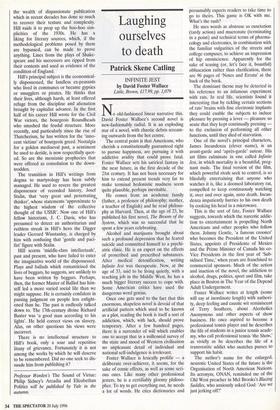Laughing ourselves to death Patrick Skene Catling
INFINITE JEST by David Foster Wallace Little, Brown, £17.99, pp. 1,079
No old-fashioned linear narrative this. David Foster Wallace's second novel is new-fashionably radial. It is an exploding star of a novel, with chaotic debris scream- ing outwards from the hot centre.
The central point is that Americans, who cherish a constitutionally guaranteed right to pursue happiness, are pursuing it with addictive avidity that could prove fatal. Foster Wallace sets his satirical fantasy in the near future, in the first decade of the 21st century. It has not been necessary for him to extend present trends very far to make terminal hedonistic madness seem quite plausible, perhaps inevitable.
He comes from an academic family (father, a professor of philosophy; mother, a teacher of English) and he read philoso- phy at Harvard. Then, at the age of 23, he published his first novel, The Broom of the System, which was so successful that he spent a few years celebrating.
Alcohol and marijuana brought about such a profound depression that he feared suicide and committed himself to a psychi- atric clinic. He is an expert on the effects of proscribed and prescribed substances. After medical detoxification, writing Infinite Jest was therapeutic. Now, at the age of 33, said to be living quietly, with a teaching job in the Middle West, he has a much bigger literary success to cope with. Some American critics have used the dangerous word genius.
Once one gets used to the fact that this enormous, shapeless novel is devoid of that artificial pattern which used to be known as a plot, reading the book is itself a sort of addiction, which, with luck, should prove temporary. After a few hundred pages, there is a surrender of will which enables one to accept that in a millennial survey of the state and mood of Western civilisation no unpleasant detail of individual and national self-indulgence is irrelevant.
Foster Wallace is lexically prolific — a deliberate over-achiever, it seems, for the sake of comic effects, as well as some seri- ous ones. Like many other professional jesters, he is a certifiably gloomy philoso- pher. To try to get everything out, he needs a lot of words. He cites dictionaries and presumably expects readers to take time to go to theirs. This game is OK with me. What's the rush?
He uses words as abstruse as cunctation (tardy action) and mucronate (terminating in a point) and technical terms of pharma- cology and electronics, in combination with the familiar vulgarities of the streets and college campuses, to achieve an impression of hip omniscience. Apparently for the sake of teasing (or, let's face it, boastful) obfuscation rather than clarification, there are 96 pages of 'Notes and Errata' at the back of the book.
The dominant theme may be detected in his reference to an infamous experiment with rats. In real life, scientists found it interesting that by tickling certain sections of rats' brains with fine electronic implants they could enable the subjects to induce pleasure by pressing a lever — pleasure so acute that they kept continually pressing to the exclusion of performing all other functions, until they died of starvation.
One of the novel's principal characters, James Incandenza (clever name), is an avant-garde and 'apres-garde' auteur. His art films culminate in one called Infinite Jest, in which mortality is a beautiful, preg- nant nude. The final version of the film, which powerful rivals seek to control, is so blissfully entertaining that anyone who watches it is, like a doomed laboratory rat, compelled to keep continuously watching it, over and over again, unto death. Incan- denza impatiently hurries to his own death by cooking his head in a microwave.
This is the sort of fate, Foster Wallace suggests, towards which the narcotic addic- tion to entertainment is propelling North Americans and other peoples who follow them. Johnny Gentle, 'a famous crooner' who becomes the President of the United States, appoints el Presidente of Mexico and the Prime Minister of Canada his co- Vice Presidents in the first year of 'Sub- sidised Time,' when years are franchised to commercial sponsors. Much of the action and inaction of the novel, the addiction to alcohol, drugs, politics, sport and film, take place in Boston in The Year of the Depend Adult Undergarment.
Foster Wallace writes at length (some will say at inordinate length) with authori- ty, deep feeling and caustic wit reminiscent of Terry Southern, about Alcoholics Anonymous and other aspects of show business. He once aspired to become a professional tennis player and he describes the life of students in a junior tennis acade- my, who call professional tennis 'the Show,' as vividly as he describes the life of a transvestite addict who snatches purses to support his habit.
The author's name for the enlarged, neurotic United States of the future is the Organisation of North American Nations. Its acronym, ONAN, reminded me of the Old West preacher in Mel Brooks's Blazing Saddles, who anxiously asked God: 'Are we just jerking off?'


























































 Previous page
Previous page